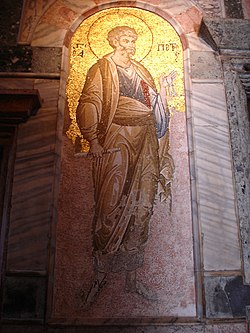
The Acts of the Apostles is the fifth book of the New Testament; it tells of the founding of the Christian Church and the spread of its message to the Roman Empire.

The Second Coming is the Christian belief that Jesus will return to Earth after his ascension to heaven. The idea is based on messianic prophecies and is part of most Christian eschatologies. Other faiths have various interpretations of it.

The life of Jesus is primarily outlined in the four canonical gospels, which includes his genealogy and nativity, public ministry, passion, prophecy, resurrection and ascension. Other parts of the New Testament – such as the Pauline epistles which were likely written within 20 to 30 years of each other, and which include references to key episodes in the life of Jesus, such as the Last Supper, and the Acts of the Apostles, which includes more references to the Ascension episode than the canonical gospels also expound upon the life of Jesus. In addition to these biblical texts, there are extra-biblical texts that Christians believe make reference to certain events in the life of Jesus, such as Josephus on Jesus and Tacitus on Christ.

The primacy of Peter, also known as Petrine primacy, is the position of preeminence that is attributed to Peter among the Twelve Apostles.
The Power of the Keys, also known as the Office of the Keys, is a responsibility given to St. Peter to usher in the Kingdom of God on the Day of Pentecost, and a responsibility given to the other apostles by Jesus, according to Matthew 16:19 and Matthew 18:18. It is understood as a responsibility to admit or exclude from church membership (excommunicate), to set church policy and teachings (dogma), to render binding interpretations of Sacred Scripture, and to bind and loose sins. The verb 'to loose' is used this way in John 20:23, Revelation 1:5 and by the Early Church Fathers.

The ministry of Jesus, in the canonical gospels, begins with his baptism near the River Jordan by John the Baptist, and ends in Jerusalem in Judea, following the Last Supper with his disciples. The Gospel of Luke states that Jesus was "about 30 years of age" at the start of his ministry. A chronology of Jesus typically sets the date of the start of his ministry at around AD 27–29 and the end in the range AD 30–36.
Matthew 16 is the sixteenth chapter in the Gospel of Matthew in the New Testament section of the Christian Bible. Jesus begins a journey to Jerusalem from the vicinity of Caesarea Philippi, near the southwestern base of Mount Hermon. Verse 24 speaks of his disciples "following him".
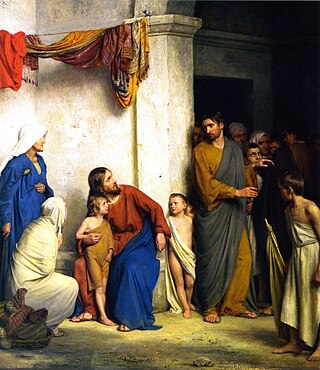
Chapter 18 of the Gospel of Matthew contains the fourth of the five Discourses of Matthew, also called the Discourse on the Church or the ecclesiastical discourse. It compares "the greatest in the Kingdom of Heaven" to a child, and also includes the parables of the lost sheep and the unforgiving servant, the second of which also refers to the Kingdom of Heaven. The general theme of the discourse is the anticipation of a future community of followers, and the role of his apostles in leading it.
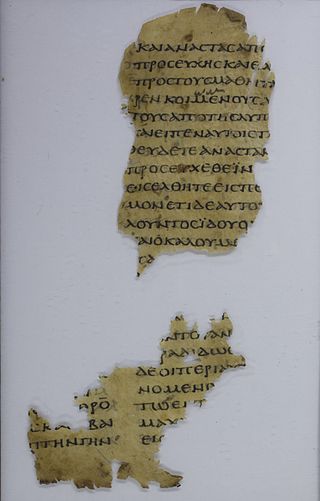
Luke 22 is the twenty-second chapter of the Gospel of Luke in the New Testament of the Christian Bible. It commences in the days just before the Passover or Feast of Unleavened Bread, and records the plot to kill Jesus Christ; the institution of the Lord's Supper; and the Arrest of Jesus and his trial before the Sanhedrin.

In Christianity, the Confession of Peter refers to an episode in the New Testament in which the Apostle Peter proclaims Jesus to be the Christ. The proclamation is described in the three Synoptic Gospels: Matthew 16:13–20, Mark 8:27–30 and Luke 9:18–21. Depending on which gospel one reads, Peter either says: 'You are the Messiah' or 'the Christ' ; or 'You are the Messiah, the Son of the living God',, or 'God's Messiah' or 'The Christ of God'.

The Keys of Heaven, also called Saint Peter's keys, refers to the metaphorical keys of the office of Saint Peter, the keys of Heaven, or the keys of the kingdom of Heaven. It is explicitly referenced in the Bible in Matthew 16:19.

Matthew 16:19 is the nineteenth verse in sixteenth chapter of the Gospel of Matthew in the New Testament of the Christian Bible. It records the words spoken by Jesus to Simon Peter. It is from this passage that Saint Peter is often said to be the gatekeeper of heaven.

The Session of Christ or heavenly session is a Christian doctrine stating that Jesus Christ is seated at the right hand of God the Father in Heaven—the word "session" is an archaic noun meaning "sitting". Although the word formerly meant "the act of sitting down", its meaning is somewhat broader in current English usage, and is used to refer to a sitting for various reasons, such as a teaching session, or a court or council being in session. The New Testament also depicts Jesus as standing and walking in Heaven, but the Session of Christ has special theological significance because of its connection to the role of Christ as King. The Session of Christ is one of the doctrines specifically mentioned in the Apostles' Creed, where "sitteth on the right hand of God the Father Almighty" immediately follows the statement of the Ascension.

The commissioning of the Twelve Apostles is an episode in the ministry of Jesus that appears in all three Synoptic Gospels: Matthew 10:1–4, Mark 3:13–19 and Luke 6:12–16. It relates the initial selection of the Twelve Apostles among the disciples of Jesus.

The calling of the disciples is a key episode in the life of Jesus in the New Testament. It appears in Matthew 4:18–22, Mark 1:16-20 and Luke 5:1–11 on the Sea of Galilee. John 1:35–51 reports the first encounter with two of the disciples a little earlier in the presence of John the Baptist. Particularly in the Gospel of Mark, the beginning of the Ministry of Jesus and the call of the first disciples are inseparable.

For the majority of Christian denominations, the Holy Spirit, or Holy Ghost, is believed to be the third person of the Trinity, a triune God manifested as God the Father, God the Son, and God the Holy Spirit, each being God. Nontrinitarian Christians, who reject the doctrine of the Trinity, differ significantly from mainstream Christianity in their beliefs about the Holy Spirit. In Christian theology, pneumatology is the study of the Holy Spirit. Due to Christianity's historical relationship with Judaism, theologians often identify the Holy Spirit with the concept of the Ruach Hakodesh in Jewish scripture, on the theory that Jesus was expanding upon these Jewish concepts. Similar names, and ideas, include the Ruach Elohim, Ruach YHWH, and the Ruach Hakodesh. In the New Testament it is identified with the Spirit of Christ, the Spirit of Truth, the Paraclete and the Holy Spirit.
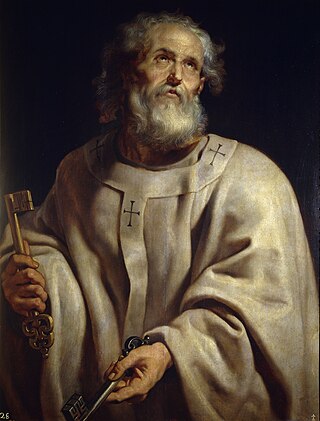
Saint Peter, also known as Peter the Apostle, Simon Peter, Simeon, Simon, or Cephas, was one of the Twelve Apostles of Jesus Christ and one of the first leaders of the early Christian Church. He appears repeatedly and prominently in all four New Testament gospels as well as the Acts of the Apostles. Catholic and Orthodox tradition accredits Peter as the first bishop of Rome—or pope—and also as the first bishop of Antioch.

In Christianity, the term Five Discourses of Matthew refers to five specific discourses by Jesus within the Gospel of Matthew.
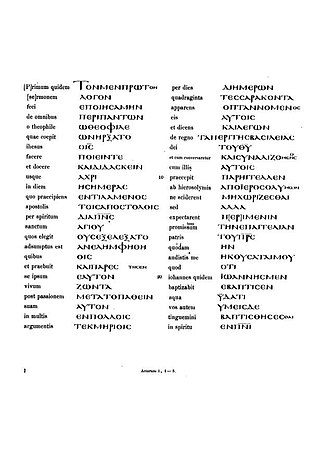
Acts 1 is the first chapter of the Acts of the Apostles in the New Testament of the Christian Bible. The book containing this chapter is anonymous but early Christian tradition affirmed that Luke composed this book as well as the Gospel of Luke. This chapter functions as a transition from the "former account" with a narrative prelude, repeated record of the ascension of Jesus Christ with more detail and the meeting of Jesus' followers, until before Pentecost.
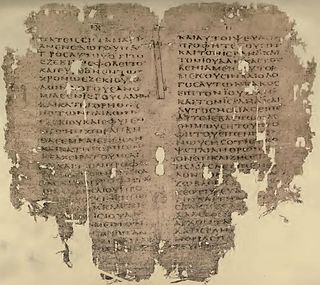
Acts 2 is the second chapter of the Acts of the Apostles in the New Testament of the Christian Bible. The book containing this chapter is anonymous but early Christian tradition asserted that Luke composed this book as well as the Gospel of Luke. This chapter records the events on the day of Pentecost, about 10 days after the ascension of Jesus Christ.

